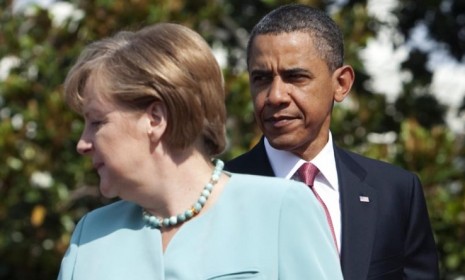The European debt crisis: Can Obama do anything to stop it?
The president is hosting European leaders at Camp David, where he is expected to lobby for action on a far-off crisis that threatens to spill onto America's shores

President Obama is hosting leaders of the Group of Eight economies at Camp David in Maryland, where Europe's spiraling debt crisis is expected to be the top topic of conversation. European officials are working on emergency plans for Greece's possible exit from the euro currency, a development that could unleash chaos in global markets and stall America's fragile economic recovery. The White House views the crisis, and its potential impact on the U.S., as one of the biggest challenges facing Obama's re-election bid. The president is expected to wield as much influence as he can in encouraging Germany, Europe's biggest economy, to ease up on harsh austerity policies that have deepened the recession in Greece and encouraged the country to flirt with a euro exit. Can Obama avert European disaster?
Obama's influence has its limits: Obama "will find his diplomatic clout tested" at the G-8 summit, says Ben Feller of The Associated Press. Obama can "prod Europe toward more growth and less budget-slashing austerity," but the U.S. "is not in the lead of that fight," and can't back up its pressure with financial aid. Obama has "home field advantage," and the summit is his "best chance to hold sway with" Germany, but don't expect any game-changing breakthroughs.
"Obama's home-turf summits will test his leverage"
The Week
Escape your echo chamber. Get the facts behind the news, plus analysis from multiple perspectives.

Sign up for The Week's Free Newsletters
From our morning news briefing to a weekly Good News Newsletter, get the best of The Week delivered directly to your inbox.
From our morning news briefing to a weekly Good News Newsletter, get the best of The Week delivered directly to your inbox.
But he should still push Germany hard: Obama "must press Chancellor Angela Merkel of Germany to commit to a eurozone growth package," says The New York Times in an editorial. "Her one-size-fits-all austerity program has been a failure, pushing heavily indebted countries deeper into recession, making it even harder for them to pay off their debts." At the very least, Obama can provide Merkel with "political cover" to change her position, "after insisting for so long that the profligate must pay for their sins."
"Germany, the crisis, and the G-8"
And Obama won't be alone: Merkel will find herself "isolated as other world leaders push her to help stimulate the economy in Europe," says Britain's The Financial Times. Obama is holding a one-on-one meeting with newly inaugurated French President Francois Hollande, who surged to power on a promise to reorient Europe's economic policies toward growth. British Prime Minister David Cameron supports Hollande's plan, while Italian Prime Minister Mario Monti is "closer to the position of" Hollande than Merkel. With pressure from Obama and others, the G-8 could emerge united behind a plan on how to avert disaster in Europe.
"Merkel faces G-8 isolation on eurozone"
A free daily email with the biggest news stories of the day – and the best features from TheWeek.com
-
 Political cartoons for January 24
Political cartoons for January 24Cartoons Saturday's political cartoons include 3D chess, political distractions, and more
-
 Ryanair/SpaceX: could Musk really buy the airline?
Ryanair/SpaceX: could Musk really buy the airline?Talking Point Irish budget carrier has become embroiled in unlikely feud with the world’s wealthiest man
-
 Claudette Colvin: teenage activist who paved the way for Rosa Parks
Claudette Colvin: teenage activist who paved the way for Rosa ParksIn The Spotlight Inspired by the example of 19th century abolitionists, 15-year-old Colvin refused to give up her seat on an Alabama bus